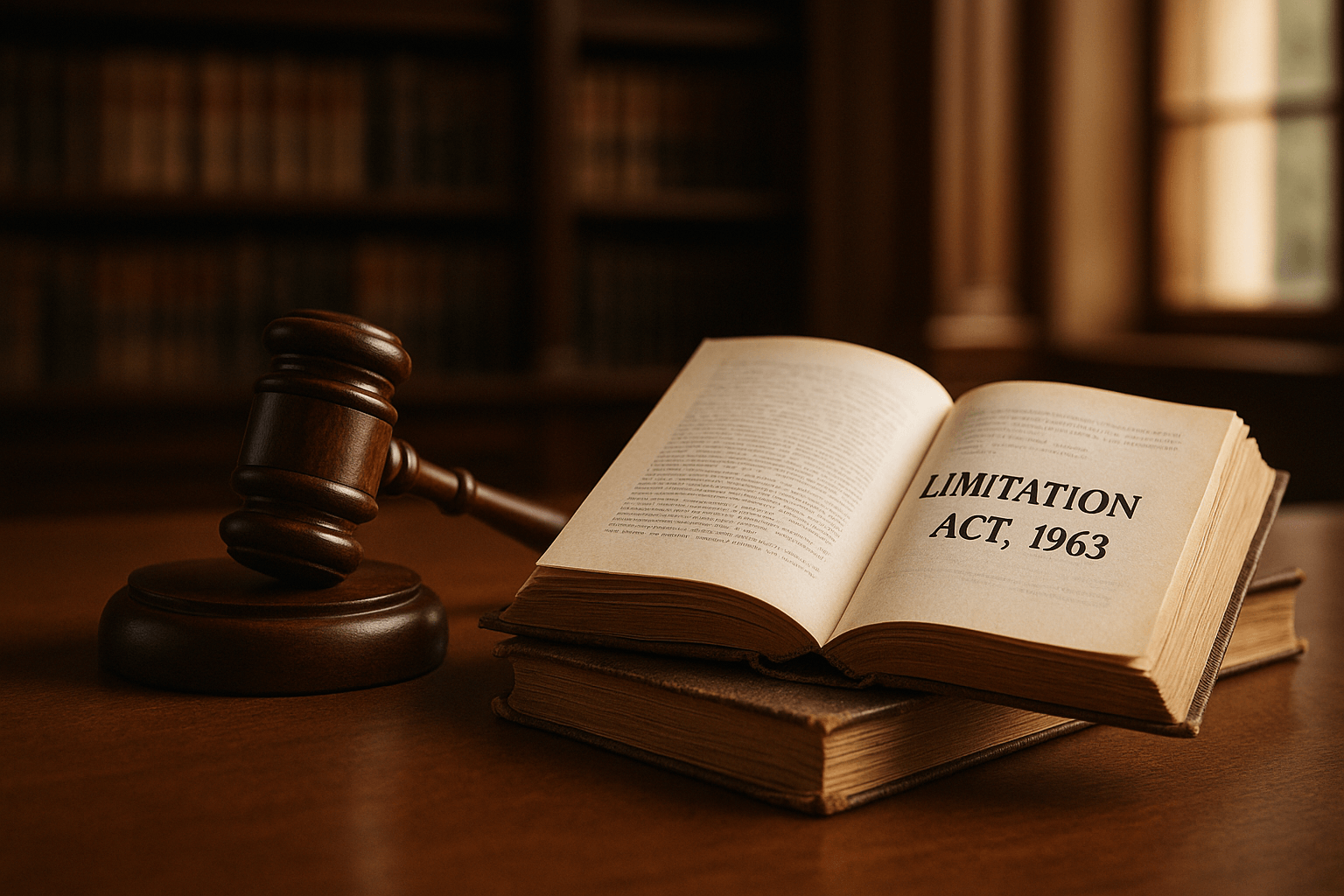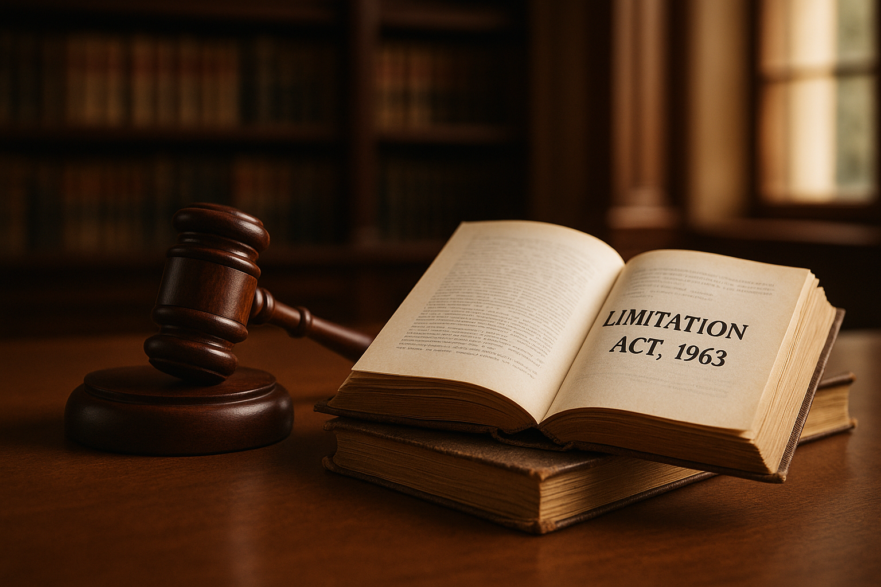
⏱ Computation of Period of Limitation – Section 12 Limitation Act
Topics Covered:
- Exclusion of time in legal proceedings: Section 12 Limitation Act
- Object of Section 12 Limitation Act
- True scope of the expression “TIME REQUISITE” in Section 12(2) Limitation Act
- Supreme Court in State of Uttar Pradesh v. Maharaj Narain [1968]
📜 Supreme Court on Section 12
- No application is required to be made seeking the benefit of Section 12 of the Limitation Act
- The expression ‘time requisite’ cannot be understood as the time absolutely necessary for obtaining the copy of the order.
Preparation for RJS, DJS, PCS (J) and other Judicial Service exams
📘 Limitation Act Explained – Section 12
The Limitation Act is an important component of any and every Judicial Service exam in the country. Its thorough knowledge is a must for all aspirants of RJS, DJS, PCS (J) and every other Judicial Service exam. To help such aspirants, DELHI LAW ACADEMY JAIPUR has launched a series of study material modules on all important aspects of this important part of their syllabus:
Section 12(1) – Exclusion of time in legal proceedings
- In computing the period of limitation
- for any suit, appeal or application
- the day from which such period is to be reckoned
- shall be excluded
Section 12(2)
- In computing the period of limitation
- for an appeal or for revision or review of a judgment
- the day on which the judgment was pronounced and
- the time requisite
- for obtaining a copy of the decree, sentence or order appealed from or sought to be revised or reviewed
- shall be excluded
Section 12(3)
- Where
- a decree or order is appealed from or sought to be revised or reviewed
- time requisite for obtaining a copy of the judgment
- shall also be excluded
Section 12(4)
- In computing the period of limitation
- for an application to set aside an award
- time requisite for obtaining a copy of the award
- shall be excluded
Explanation
- In computing the time requisite
- for obtaining a copy of a decree or an order
- any time taken by the court
- to prepare the decree or order before an application for a copy is made
- shall not be excluded
Explanatory Notes from DLA on Section 12
Object of Section 12:
The underlying purpose of these provisions is to enable a litigant seeking enforcement of his right to any remedy to do so effectively and harsh prescription of time bar not unduly interfering with the exercise of statutory rights and remedies. That is why Section 12 has always been liberally interpreted.
- No distinction is drawn between decrees or orders pronounced on the original side or the appellate or revisional side.
- No application is required to be made seeking the benefit of Section 12 of the Limitation Act; it is the statutory obligation of the court to extend the benefit where available.
- Although the language of sub-section (2) of Section 12 is couched in a form mandating the time requisite for obtaining the copy being excluded from computing the period of limitation, the easier way of expressing the rule and applying it in practice is to find out the period of limitation prescribed and then add to it the time requisite for obtaining the copy – the date of application for copy, and the date of delivery, thereof both included – and treat the result of addition as the period of limitation.
- The expression ‘time requisite’ cannot be understood as the time absolutely necessary for obtaining the copy of the order. What is deducible under s. 12(2) is not the minimum time within which a copy of the order appealed against could have been obtained.
- That section lays no obligation on the appellant to be prompt in his application for a copy of the order. There is no justification for restricting the scope of that provision.
- It does not make any difference whether the application for certified copy was made within the prescribed period of limitation or beyond it.
- The word ‘requisite’ is a strong word; it may be regarded as meaning something more than the word ‘required’. It means ‘properly required’ and it throws upon the pleader or counsel for the appellant the necessity of showing that no part of the delay beyond the prescribed period is due to his fault.
- It is well settled that by virtue of sub-section (2) of Section 29 of the Limitation Act the provisions of Section 12 are applicable for computing the period of limitation prescribed by any special or local law.
Question:
Elucidate the true scope of expression “time requisite as it appears in section 12?
Ans: Case study: State of Uttar Pradesh v. Maharaj Narain [1968 SC]
Issue:
True scope of the expression “time requisite for obtaining a copy of the decree, sentence or order appealed from“.
Facts of the Case:
- Memorandum of appeal filed: March 29, 1963.
- The order appealed from had been delivered on November 10, 1962.
- According to information contained in the copy of the order submitted along with the memorandum of appeal, that copy was applied for on November 15, 1962 and the same was ready on January 3, 1963.
- In addition to this copy, the appellant had applied for another copy of the order appealed from on Dec 3, 1962 and that copy was ready for delivery an Dec 20.
- The appellant had also applied for yet another copy of the same order on Dec 21 and that copy was made ready on the same day.
Computing the Period of Limitation:
- If the period of limitation is computed on the basis of those two copies, the appeal was barred by limitation.
- But the point for consideration is whether the obtaining of those two copies has any relevance in the matter of computing the period of limitation for this appeal.
High Court:
- The High Court took into consideration the copies made available to the appellant on the 20th and 21st Dec 1962.
- It opined that the expression ‘requisite’ found in s. 12(2) means “properly required”, and hence the limitation has to be computed on the basis of the copy made available to the appellant in December, 1962.
Supreme Court:
- It was not necessary for the appellant to apply for a copy of the order appealed from immediately after the order was pronounced.
- The appellant could have, if it chose to take the risk, waited till the ninety days period allowed to it by the statute was almost exhausted.
- Even then the time required for obtaining a copy of the order would have been deducted in calculating the period of limitation.
Question:
Can the expression ‘time requisite’ be understood as the time absolutely necessary for obtaining the copy of the order?
Ans:
- The expression ‘time requisite’ cannot be understood as the time absolutely necessary for obtaining the copy of the order.
- What is deducible under s. 12(2) is not the minimum time within which a copy of the order appealed against could have been obtained.
- Sub-s. 2 of s. 12 enlarges the period of limitation. It permits the appellant to deduct from the time taken for filing the appeal, the time required for obtaining the copy of the order appealed from and not any lesser period which might have been occupied if the application for copy had been filed at some other date.
- That section lays no obligation on the appellant to be prompt in his application for a copy of the order.
- If the appellate courts are required to find out in every appeal filed before them the minimum time required for obtaining a copy of the order appealed from, it would be unworkable.
- In that event every time an appeal is filed, the court not only will have to see whether the appeal is in time on the basis of the information available from the copy of the order filed along with the memorandum of appeal but it must go further and hold an enquiry whether any other copy had been made available to the appellant and if so what was the time taken by the court to make available that copy.
Summary of the Case:
- In this case, the appellant obtained three copies of the order appealed against by applying on three different dates.
- He filed along with the memorandum of appeal that copy which had taken the maximum time for its preparation and sought to exclude such maximum time in computing the period of limitation for filing the appeal.
- The Supreme Court observed that the expression time requisite in Section 12(2) cannot be understood as the time absolutely necessary for obtaining the copy of the order and that what is deductible u/s 12(2) is not the minimum time within which a copy of the order appealed against could have been obtained.
📚 Continue Your Limitation Act Preparation
Don’t stop here! Strengthen your knowledge of the Limitation Act with our other fully solved tests:
📘 Free Study Material for Judiciary Aspirants!
Download our FREE study material prepared by Delhi Law Academy’s expert faculty.
❓ Frequently Asked Questions on Section 12 of the Limitation Act
⏱ What is the meaning of “time requisite” under Section 12(2)?
“Time requisite” refers to the period properly required for obtaining a copy of the decree, sentence, or order appealed from or sought to be revised or reviewed. It is not the minimum time, but the time necessary without attributing fault to the appellant.
⚖️ Do we need to apply to the court for Section 12 benefits?
No application is required. It is the statutory obligation of the court to extend the benefit of Section 12 when computing the period of limitation.
📝 How is the period of limitation computed under Section 12(1)?
In computing the period for any suit, appeal, or application, the day from which the period is reckoned shall be excluded.
🏛 Does Section 12 apply to appeals, revisions, and reviews?
Yes. Section 12(2) and 12(3) provide that the day of judgment pronouncement and the time requisite for obtaining a copy shall be excluded when computing the limitation period for appeals, revisions, or reviews.
⏳ What did the Supreme Court hold in State of Uttar Pradesh v. Maharaj Narain [1968]?
The Supreme Court held that “time requisite” cannot be interpreted as the absolute minimum time for obtaining a copy. The appellant can exclude the maximum time taken for the preparation of the order in computing limitation.
📚 What is the main objective of Section 12 of the Limitation Act?
Section 12 ensures that harsh prescription of time does not interfere with the exercise of statutory rights and remedies, enabling litigants to seek enforcement effectively without being unduly barred by technicalities.
Contact us
📍 Delhi Law Academy – Jaipur Branch
6C, Tower 2, Coaching Hub, Pratap Nagar, Jaipur – 302033
📞 Phone:
+91 9911916552
+91 8447285606
✉️ Email:
contactus@delhilawacademy.com

